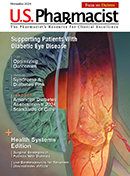As frontline healthcare professionals, pharmacists confront vaccine hesitancy on a near-daily basis. Concerns about the safety of vaccines remain widespread; the World Health Organization named vaccine hesitancy as one of the top ten threats to global health in 2019.
A study in Frontiers of Microbiology points out, “The reasons why people choose not to vaccinate are complex, but lack of confidence in vaccine safety, driven by concerns about adverse events, has been identified as one of the key factors.”
On the other hand, medical professionals such as pharmacists can make a difference, according to The Children’s Hospital of Philadelphia–led authors. “Healthcare workers, especially those in primary care, remain key influencers on vaccine decisions. It is important, therefore, that they be supported by having easy access to trusted, evidence-based information on vaccines,” they explain.
The study lists the following as among the key concerns:
• Adjuvants, such as aluminum
• Preservatives, such as mercury
• Inactivating agents, such as formaldehyde
• Manufacturing residuals, such as human or animal DNA fragments
• The number of vaccines might be overwhelming, weakening or perturbing the immune system.
“As a consequence, some fear that vaccines are causing autism, diabetes, developmental delays, hyperactivity, and attention-deficit disorders, amongst others,” the authors note, adding that their review addresses the topics and highlights scientific evidence that refutes common concerns about vaccine safety.
Also new is an overview led by Johns Hopkins University researchers that updates the scientific evidence on assessing possible causal associations of adverse events following immunization (AEFI). The update was based on the 2012 report from the Institute of Medicine and the 2014 report from the Agency for Healthcare Research and Quality.
The article in The Lancet Infectious Diseases notes that, for 12 of 46 AEFI examined, a causal relationship has been established with at least one vaccine currently routinely recommended to the general U.S. population: anaphylaxis, arthralgia or arthritis (mild, acute, and transient, not chronic), deltoid bursitis (when vaccine is administered improperly), disseminated varicella infection (in immune-deficient individuals for whom the varicella vaccine is contraindicated), encephalitis, febrile seizures, Guillain-Barré syndrome, hepatitis (in immune-deficient individuals for whom the varicella vaccine is contraindicated), herpes zoster, immune thrombocytopenic purpura, meningitis, and syncope.
“Other than mild acute and transient arthralgia or arthritis, which is very common in adult women after rubella vaccine, these adverse reactions are rare or very rare,” the authors write. “Vaccines have an excellent safety profile overall and provide protection against infectious diseases to individuals and the general population.”
« Click here to return to Vaccine Update.






